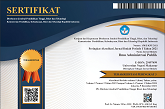The Influence of Leadership, Organizational Commitment, and Work Culture on Employee Competence and Performance with Moderation of Employee Development Policies at the Education Office of North Sumatra Province
(1) Pasundan University, Bandung, Indonesia
(2) Pasundan University, Bandung, Indonesia
(3) Pasundan University, Bandung, Indonesia
(4) Pasundan University, Bandung, Indonesia
(5) Pasundan University, Bandung, Indonesia
(*) Corresponding Author
DOI: https://doi.org/10.26858/jiap.v13i1.45275
Abstract
The success of education and teaching at private universities in North Sumatra Province will depend heavily on the quality of lecturers who are able to produce high lecturer performance. which in the end will be able to improve the performance of the private university. This study aims to identify, analyze and examine Visionary Leadership, Organizational Culture, and Lecturer Competence on Affective Commitment and Job Satisfaction and Their Implications for Lecturer Performance at Private Universities in North Sumatra. This study used a quantitative method with a descriptive analysis and verification analysis approach. In this study, the sample was the lecturers who received the fixed income with a sample of 212 lecturers. The method of analysis in this study uses path analysis (path analysis). The results of the study concluded that: 1). There is a significant influence from Visionary Leadership, Organizational Culture, and Lecturer Competence on Affective Commitment, with a magnitude of influence of 73.18 percent 2). There is a significant influence from Visionary Leadership, Organizational Culture, and Lecturer Competence on Job Satisfaction with an influence of 75.11 percent, and 3) there is a significant influence. of affective commitment and job satisfaction on lecturer performance with an influence size of 85.57 percent. 11 percent, and 3) there is a significant effect. of affective commitment and job satisfaction on lecturer performance with an influence size of 85.57 percent. 11 percent, and 3) there is a significant effect. of affective commitment and job satisfaction on lecturer performance with an influence size of 85.57 percent.
Keywords
Full Text:
PDFReferences
Andalangi, A., Sambiran, S., & Sumampow, I. (2022). Pengembangan Kompetensi Aparatur Sipil Negara di Daerah Kepulauan (Studi di Kantor Badan Kepegawaian dan Pengembangan Sumber Daya Manusia Kabupaten Kepulauan Talaud). GOVERNANCE, 2(1).
Balthazard, P. A., & Cooke, R. A. (2004). Organizational culture and knowledge management success: Assessing the behavior-performance continuum. Proceedings of the Hawaii International Conference on System Sciences, 37(October 2014), 3741–3750. https://doi.org/10.1109/hicss.2004.1265577
Chênevert, D., Vandenberghe, C., Doucet, O., & Ben Ayed, A. K. (2013). Passive leadership, role stressors, and affective organizational commitment: A time-lagged study among health care employees. European Review of Applied Psychology, 63(5), 277–286. https://doi.org/https://doi.org/10.1016/j.erap.2013.07.002
Connors, M. C., & Morris, P. A. (2015). Comparing state policy approaches to early care and education quality: A multidimensional assessment of quality rating and improvement systems and child care licensing regulations. Early Childhood Research Quarterly, 30, 266–279.
Datzberger, S. (2018). Why education is not helping the poor. Findings from Uganda. World Development, 110(2018), 124–139. https://doi.org/10.1016/j.worlddev.2018.05.022
Domine, V. (2011). Building 21st-Century Teachers: An Intentional Pedagogy of Media Literacy Education. Action in Teacher Education. https://doi.org/10.1080/01626620.2011.569457
Fitrah, M., & others. (2018). Metodologi penelitian: penelitian kualitatif, tindakan kelas & studi kasus. CV Jejak (Jejak Publisher).
Hamdani, A. D., Nurhafsah, N., & Silvia, S. (2022). Inovasi Pendidikan Karakter Dalam Menciptakan Generasi Emas 2045. JPG: Jurnal Pendidikan Guru, 3(3), 170–178.
Junaidi, J., & Zulgani, Z. (2011). Peranan Sumberdaya Ekonomi dalam Pembangunan Ekonomi Daerah. Jurnal Pembangunan Daerah, 3, 27–33.
Kaper, M. S., Sixsmith, J., Reijneveld, S. A., & de Winter, A. F. (2021). Outcomes and Critical Factors for Successful Implementation of Organizational Health Literacy Interventions: A Scoping Review. International Journal of Environmental Research and Public Health, 18(22), 11906. https://doi.org/10.3390/ijerph182211906
Kusumaningsih, O., & others. (2020). Pengaruh Kompetensi Dan Budaya Organisasi Terhadap Komitmen Serta Dampaknya Pada Kinerja Pegawai Pada Badan Pendapatan, Pengelolaan Keuangan Dan Aset Daerah (BPPKAD) Kabupaten Cilacap. Majalah Ilmiah Dinamika Administrasi (MIDA), 17(2), 56–65.
Latif, K. F., Latif, I., Farooq Sahibzada, U., & Ullah, M. (2019). In search of quality: measuring higher education service quality (HiEduQual). Total Quality Management & Business Excellence, 30(7–8), 768–791.
Mardhiyah, R. H., Aldriani, S. N. F., Chitta, F., & Zulfikar, M. R. (2021). Pentingnya keterampilan belajar di abad 21 sebagai tuntutan dalam pengembangan sumber daya manusia. Lectura: Jurnal Pendidikan, 12(1), 29–40.
Moleong, L. J. (2017). Metode penelitian kualitatif, Bandung: PT. Remaja Rosda Karya.
Nurhidayah, B. (2014). Pelatihan berbasis konsep pendidikan untuk pembangun berkelanjutan dalam peningkatan mutu layanan play tutor di komunitas sahabat kota Bandung. Jurnal Pendidikan Luar Sekolah, 10(2).
Podsakoff, P. M., MacKenzie, S. B., & Bommer, W. H. (1996). Transformational Leader Behaviors and Substitutes for Leadership as Determinants of Employee Satisfaction, Commitment, Trust, and Organizational Citizenship Behaviors. Journal of Management, 22(2), 259–298. https://doi.org/10.1177/014920639602200204
Rengifurwarin, Z. A., Akib, H., Jasruddin, & Salam, R. (2018). Snapshot of public service quality in the center for integrated business service (CIBS), cooperative micro small and medium enterprises (CMSME), Maluku province, Indonesia. Journal of Entrepreneurship Education, 21(3).
Sarnoto, A. Z. (2017). Sumber Daya Manusia Dalam Pendidikan Islam. Madani Institute: Jurnal Politik, Hukum, Pendidikan, Sosial, Dan Buadaya, 6(2).
Shen, H., Luo, J. M., & Lam, C. F. (2015). Evaluating the quality of hospitality and tourism education in vocational institute in China. International Journal of Marketing Studies, 7(3), 12.
Sholehah, I. N., & Angin, R. (2018). Implementasi Program Peningkatan Kinerja Pegawai Negeri Aparatur Pemerintah Daerah Di Badan Kepegawaian Dan Pengembangan Sdm Kabupaten Jember. Universitas Muhammadiyah Jember.
Sugiyono, P. D. (2018). Quantitative, qualitative, and R&D research methods. Bandung:(ALFABETA, Ed.).
Warouw, F. F., Setyawati, C. E., Sumenda, L., Lengkong, J. S. J., Mangobi, J. U. L., Katuuk, D. A., & Rotty, V. N. J. (2022). Problematika Pendidikan Pariwisata Berkelanjutan. CV. Azka Pustaka.
.
Article Metrics
Abstract view : 163 times | PDF view : 38 timesRefbacks
- There are currently no refbacks.
Copyright (c) 2023 Maludin Panjaitan, Azhar Affandi, Heru Setiawan, Sidik Priadana, Umi Narimawati

This work is licensed under a Creative Commons Attribution 4.0 International License.
Diterbitkan oleh:
Program Studi Ilmu Administrasi Publik
Program Pascasarjana Universitas Negeri Makassar
JIAP Index By:

This work is licensed under a Creative Commons Attribution 4.0 International License.









